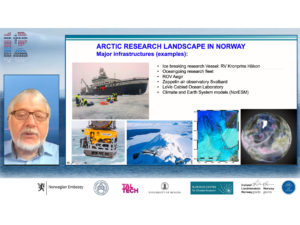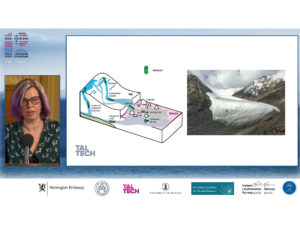The Estonian Academy of Sciences, Tallinn University of Technology, the Bjerknes Centre for Climate Research/University of Bergen and the Academia Europaea Bergen Knowledge Hub in cooperation with the Norwegian Embassy in Tallinn co-hosted the webinar “The Changing Arctic” on April 14th, a joint Estonian-Norwegian scientific event.
The webinar pointed towards further Estonian-Norwegian scientific cooperation in Arctic Research, and it also received media attention in Estonia.

Academic director at the AE-Bergen Hub, Eystein Jansen, gave an overview the Arctic/polar research landscape in Norway.
Academic director at the AE-Bergen Hub, Eystein Jansen, presented at the webinar. His presentation focused on recent evidence classifying the current climate changes in the Arctic as abrupt changes, compared to previous periods of climate change. He also gave an overview the Arctic/polar research landscape in Norway.
In a press release, the Ministry of Foreign Affairs of Estonia writes:
The joint virtual seminar “The Changing Arctic” focused on scientific cooperation between the countries to deal, with climate change and other issues related to the Arctic. Estonian Foreign Minister Eva-Maria Liimets and the State Secretary of Norway Audun Halvorsen made introductory statements. The seminar was opened by the President of the Estonian Academy of Sciences Tarmo Soomere, and Norwegian Ambassador to Estonia Else Berit Eikeland made welcoming remarks.
Foreign Minister Eva-Maria Liimets said Arctic issues had a prominent place in the action plans of both Estonia and Norway. “As a country on the Arctic coast, Norway is a major scientific power in the Arctic, and we would like to learn from and cooperate with Norway in this field. Estonia is currently applying for observer status on the Arctic Council to contribute to the sustainable development of the Arctic.”
“Scientists are observing, interpreting and analysing rapid change in the Arctic,” Minister Liimets said. “Their message is clear: climate change is the challenge of our time and nowhere is it more obvious than in the Arctic. We can only get enough data to keep up with and adapt to change in the Arctic through joint measures and international cooperation. The Arctic ecosystem is vulnerable and it is the task of concerned countries to listen to scientists and work together.”

The webinar was moderated by Professor Maarja Kruusmaa, whose joint project MAMMAMIA with the University of Oslo looks at the mechanisms of accelerating land ice loss.
The State Secretary of the Ministry of Foreign Affairs of Norway Audun Halvorsen said that cooperation in Arctic research is crucial to adapting to climate change and developing new technologies that would contribute to sustainable jobs and the creation of values. “The rising temperatures in the Arctic are mainly caused by an increase in greenhouse gas emissions worldwide and not by human activity in the region. This means that we must set and meet global targets to improve the situation in the Arctic. And Norway is determined to do its part.”
At the webinar, scientists from Estonia and Norway gave a more detailed overview of the situation in the Arctic and the impacts of the Arctic climate change in the region and on ecosystems, and also presented their work and joint projects. The seminar reaffirmed the interest of both countries in continuing and boosting cooperation – the scientists of both countries are already involved in several projects. For example, TalTech’s Department of Geology and the Norwegian Polar Institute have been engaged in drilling and analysing ice cores in Svalbard.
The webinar was moderated by Professor Maarja Kruusmaa, whose joint project MAMMAMIA with the University of Oslo looks at the mechanisms of accelerating land ice loss.
The seminar was organised by the Estonian Academy of Sciences, TalTech and the Norwegian Embassy in Estonia. The programme was compiled by the Polar Research Committee of the Estonian Academy of Sciences, the Bjerknes Centre for Climate Research at the University of Bergen, and the Academia Europaea Bergen Hub. In addition to strengthening bilateral relations and advancing the polar cooperation of Estonia and Norway, the seminar also presented Estonia’s Arctic research expertise in light of Estonia’s bid for observer status on the Arctic Council.
The seminar is part of a series of events dedicated to the centenary of diplomatic relations between Estonia and Norway.
Watch the event here.
Estonian media covered the event, among them public broadcaster ERR.
